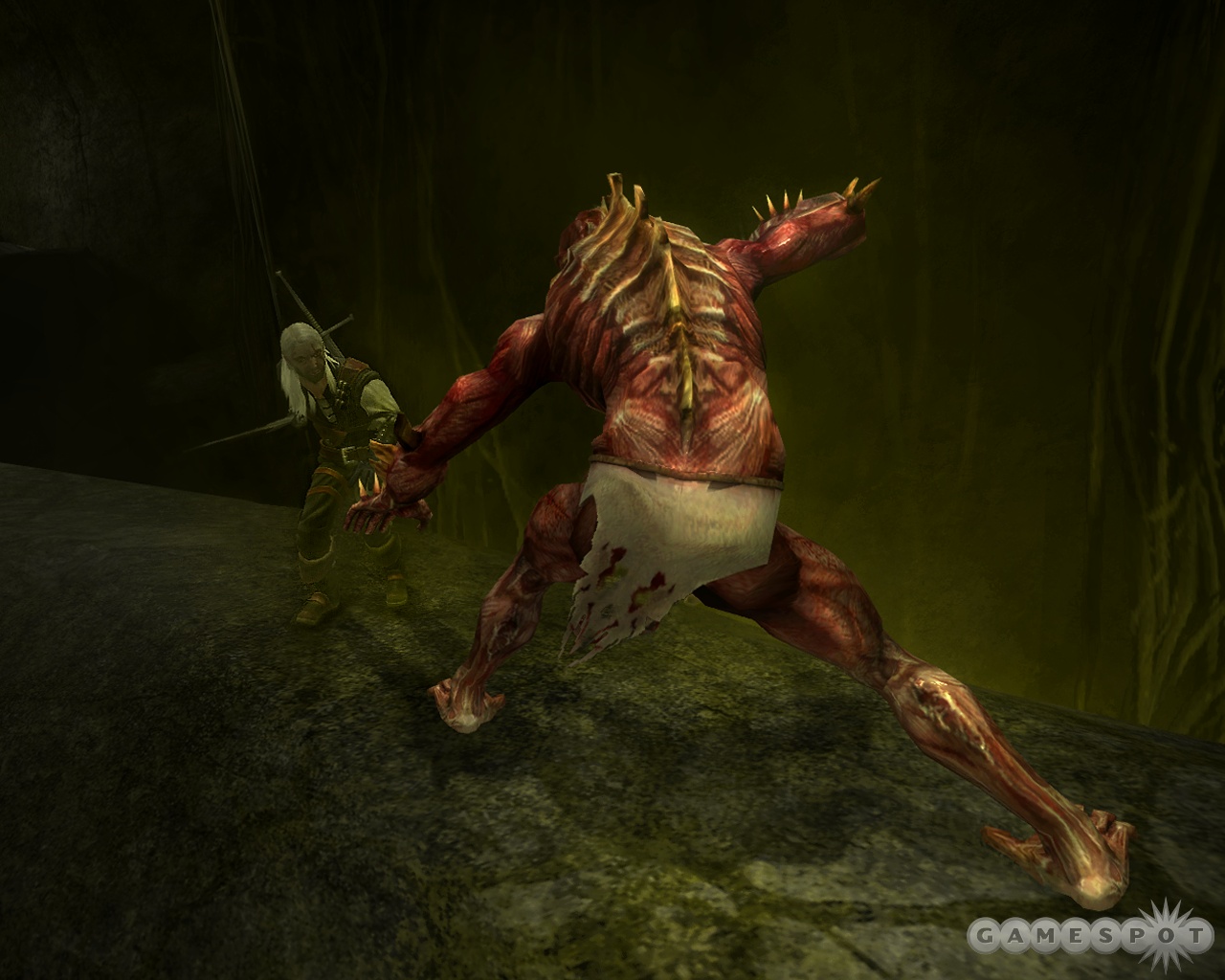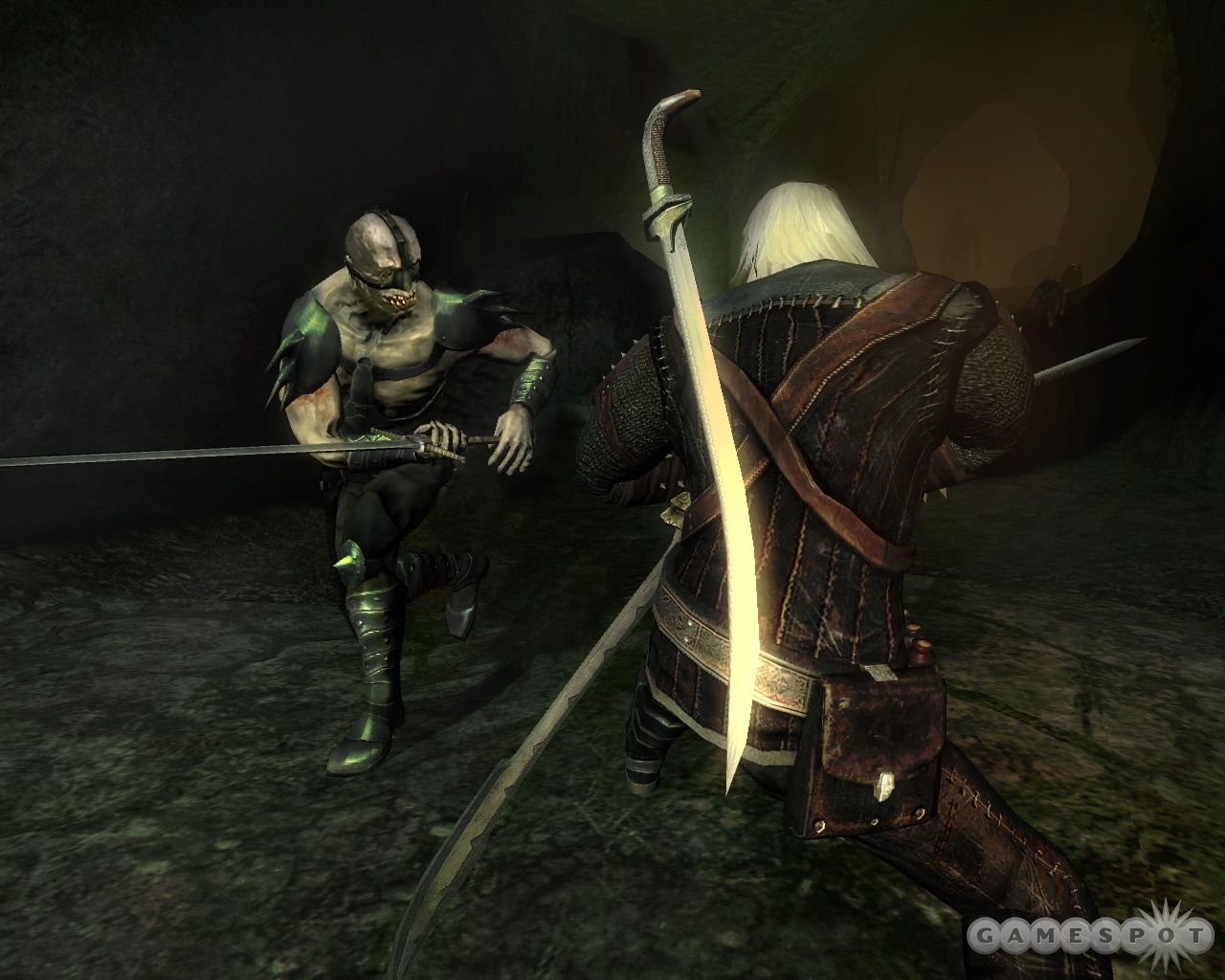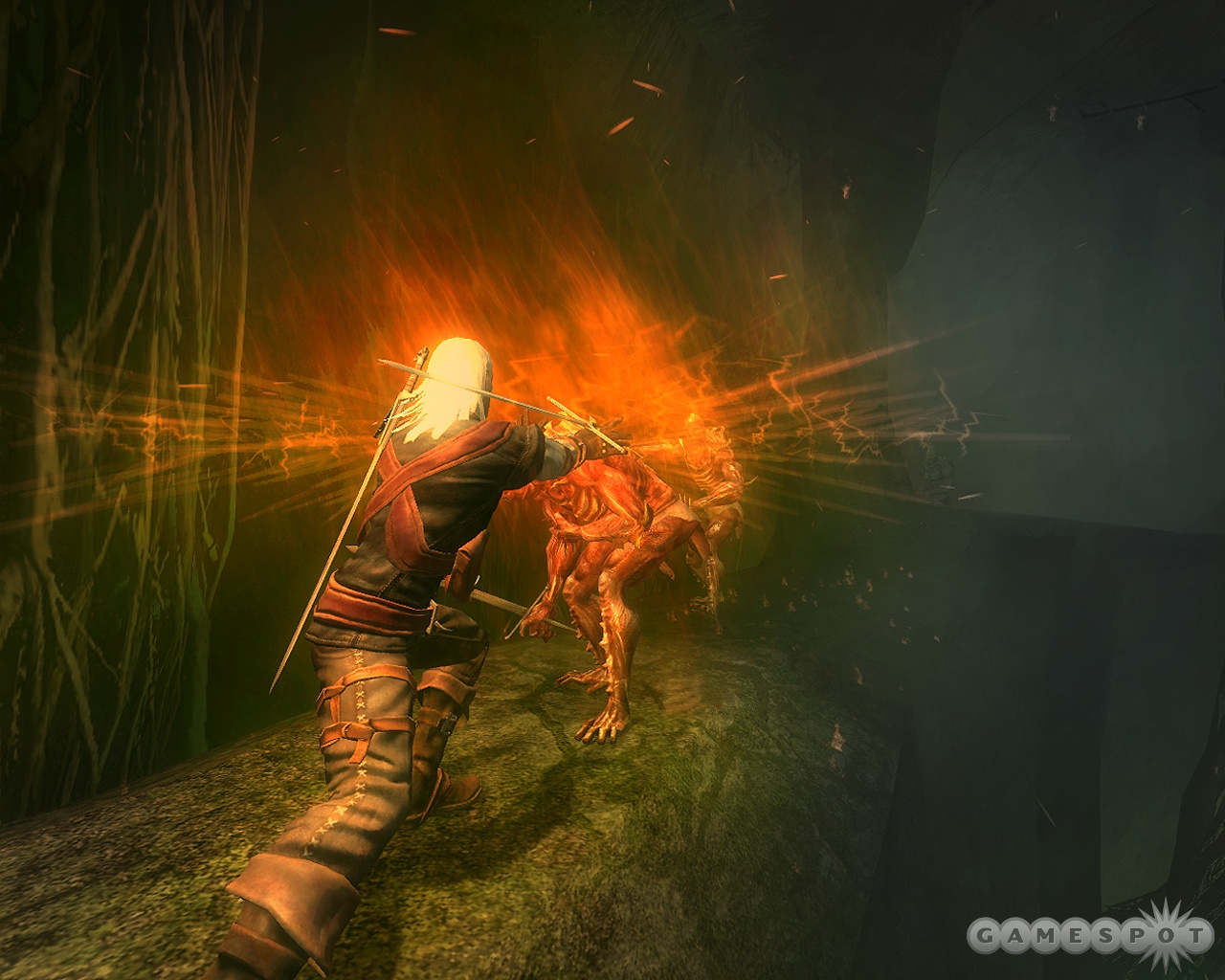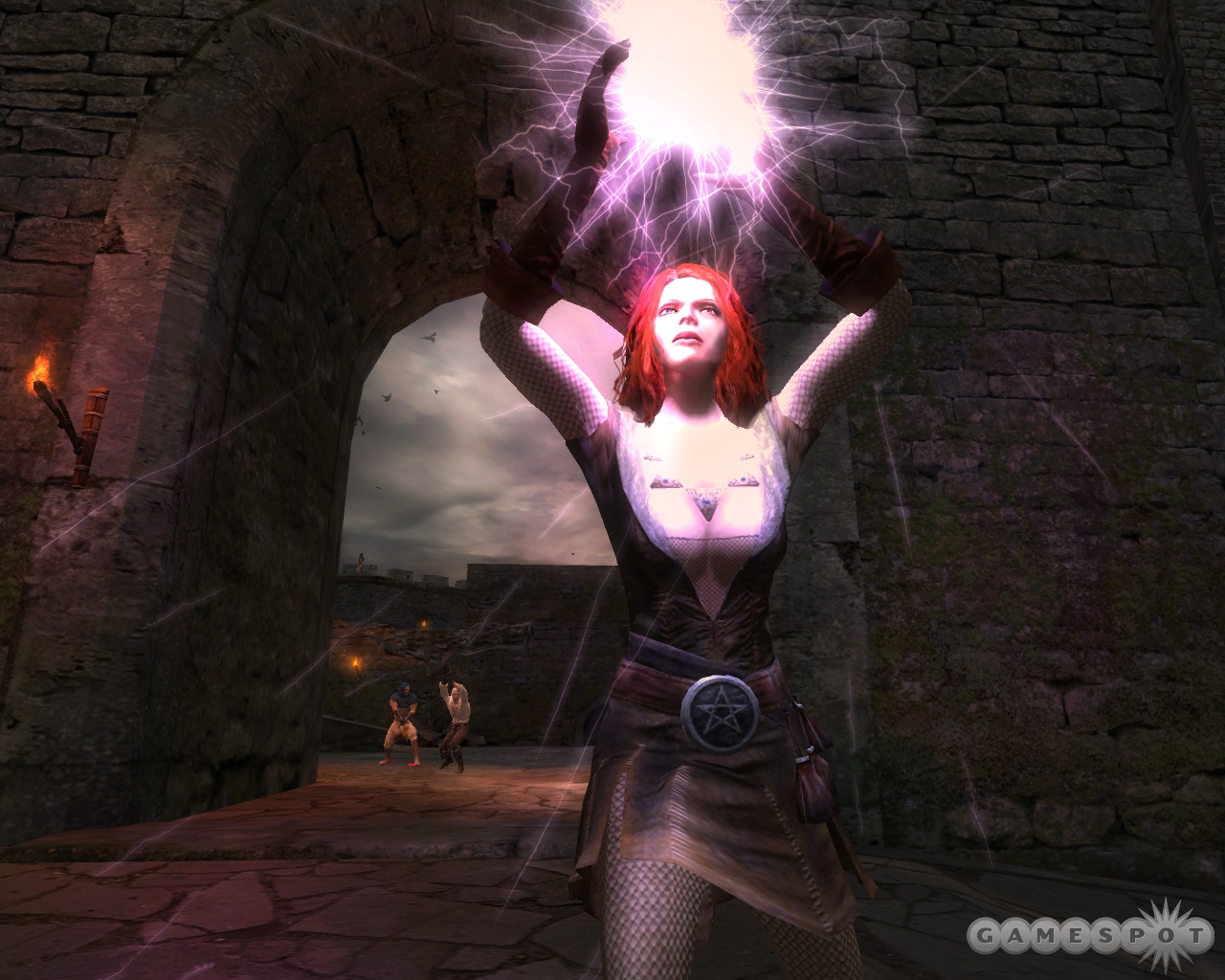The Witcher Updated Q&A - Swords, Sorcery, and Foul Beasts
Chief designer Michal Madej explains how you'll hack-and-slash your way to victory in this unusual fantasy role-playing game.
Your typical fantasy role-playing game offers colorful adventures in grassy meadows that involve pointy-eared elves. CD Projekt's The Witcher will instead offer a much darker, more complex experience based on the popular novels of Polish author Andrzej Sapkowski. In the game, you'll play as Geralt, a "witcher"--a being infused with superhuman powers who hunts monsters in a postapocalyptic and morally ambiguous fantasy world. In addition to exploring a game with an intriguing story, you'll wield a sword and hack-and-slash at hordes of monsters. Chief designer Michal Madej sat down with us to discuss how you'll fight battles and develop your character throughout the game.
GameSpot: We're familiar with the story behind the game's unusual protagonist, Geralt, but tell us about how he develops as a character in the game. How can you develop his skills in battle, for instance? What kind of weapons can he use, and how does he eventually become a more powerful warrior?
Michal Madej: As you mentioned, we have a rather unusual protagonist--Geralt the witcher, a professional monster slayer. Because he is essentially a new character class unlike anything you've seen in typical RPGs, we had to create an innovative character-development system, which takes advantage of this "unusualness." On one hand, it's a traditional level-based system, where you kill monsters and--much more importantly--complete quests to earn experience points and gain levels. [But this is] where the similarity to typical RPGs ends. We don't use any numerical traits, as we consider them simply a dull way to describe your hero. What does it mean to have 12 dexterity points, and how much better is 13? We decided to replace numbers with ability trees, where each of the abilities has significant influence on gameplay and its usefulness is instantly understood. Altogether, we have about 250 abilities, grouped in 15 "trait trees": four attributes, five magical signs, and six combat styles.

Each tree has five levels of primary abilities (the "trunk") and additional upgrades on each level (the "branches"). The main idea was to move from quantity to quality--every time players buy an ability, they get a visible difference in gameplay. In most RPGs, raising an attribute gives some small percentage bonus, which is really hard to notice--like 2 percent more chance to hit. In The Witcher, as players level up, it's impossible to overlook the fact that you have another attack animation, that you start deflecting arrows, or that you master a new spell. But players can not only buy combat abilities, but they can learn also how to gather herbs, skin monsters, brew potions, and many other things.
In all fighting skills, for example, every main level you add to the trunk is another attack (with its own animation and parameters) in a combo, with master-level abilities being final blows, usually fatal for opponents. Moreover, upgrade skills (the branches) modify how those attacks work--players can purchase an additional chance to stun, knock back, or cause bleeding. Apart from special abilities, players can also develop Geralt by finding or upgrading equipment--mostly swords, as witchers are swordmasters, but also other weapons.
GS: Tell us about the way magic works in the game. How will Geralt be able to use magic?
MM: Magic is extremely potent, but also very scarce in the world of The Witcher. Those rare people who can fully master magical energy are powerful beyond imagination and are real rulers, the powers behind the throne. Unfortunately, witchers are not those lucky ones, and they can only use simple spells, called "signs," which are more like wild bursts of elemental energy, rather than a controlled use of them. Still, intelligent combination of signs and the sword can give you a great advantage in combat. Geralt can learn and use five magical powers in two different ways. He can either "fast-cast" spells in close combat, or he can take some time to concentrate and cast a more powerful version of them.
For example, the "igni" sign can be either a swift short-distance flame strike, or a long-distance fireball which takes more time to cast. The five signs are more like spell templates players can customize, rather than being defined spells. The most famous is the "aard" sign, the trademark of witchers--a telekinetic blast that repels enemies and can even knock them down or even disarm them if upgraded properly. The igni sign, a fire spell that can be used both in close combat or as a long-range attack, can cause fear and ignite enemies. The third sign is "quen"--a shield that protects the hero from harm, but will break with any offensive action taken. The "axii" sign is not so spectacular, but can be the most powerful of them all--it's a telepathic power used to scare or even mentally control opponents. The last sign is "yrden"--a magical ward set on the ground as a trap that players can lure monsters into.
GS: What kind of tactics will you need to use in the game in order to be successful in battle? How much freedom will you have to customize your character's skills, and how open-ended is the skill system--how viable will it be, for instance, to have a character who relies heavily on magic, or instead relies heavily on certain weapons?
MM: Tactics in The Witcher require perception, common sense, and a calm mind, so you can properly analyze situations and make the right decisions in real-time action combat. It doesn't require any hardcore game-mechanic knowledge, as everything in the game is based on real and obvious rules. You see a huge opponent coming your way, you know you will have to hit hard, as the enemy is tough--it has armor or lots of health. If you can gain an advantage in combat by stunning or knocking down an opponent, for example, you can use it to kill him immediately with a coup de grace blow. Other situations include fights with a large number of opponents, when you have to use group tactics--trying to hit more than one at a time, but also protecting yourself from strikes from behind, as enemies tend to surround you.
You can also take advantage of the superhuman abilities of the witcher. When fighting against ranged enemies, Geralt can patiently wait for a shot, deflect arrows in flight, and use the time between shots to approach the opponent. But in some cases, when overwhelmed by more-powerful enemies, players will have to escape combat--witchers are renowned for their cold logic, not recklessness--by using active defense moves, jumps, or evades.
Because witchers are very flexible fighters, they can use different fighting techniques and backup spells. So, success in combat depends on how you can adapt to a new situation and make the right choice of weapons, styles, spells, and potions. Tactics will strongly depend on which kind of sword you use--steel swords against standard opponents or silver ones against magical creatures. The second choice to make is which fighting technique to use: the strong style against tough enemies, the fast style versus agile ones, and the group style while surrounded by weaker opponents. Lastly, you will have to use correct spells and potions to counter special abilities of opponents or exploit their weaknesses, like using the yrden sign to set a trap, lure monsters into it, and then kill the weakened enemies.
Although witchers can specialize in magic, you are still primarily a warrior that uses magic to gain an advantage in melee combat. We can compare witchers to medieval Jedi Knights--even though they use the powerful Force, they are still melee fighters that rely on lightsabers, rather than ranged blasters.

GS: What can you tell us about the companions that will join Geralt on his journeys? What level of control will you exert over them? Will they advance in experience and power the way he does?
MM: In The Witcher, you play the role of Geralt, and can only control his actions. During your adventures you will meet other characters, make them your friends and enemies. They will also have their own goals, motivations, and stories--characters you will meet at the beginning might change completely in the course of the game, not only in terms of abilities, but also in their personality and appearance. But all those changes are based on the storyline, rather than on the typical experience grinding. They will also join you on your quest--and in battle--from time to time--as sometimes they will have similar goals and you can cooperate to achieve them, while some will accompany you just because of friendship or even love. In this game, you must stop thinking about other characters as helpful pets with stats, but you have to treat them as living, thinking, and feeling individuals.
Monster Hunting
GS: We understand that The Witcher takes place in a dark fantasy world. What types of beings and creatures will Geralt encounter in his travels? What kind of enemies will he fight in battle?
MM: From one point of view, it's definitely a kind of fantasy realm we are all familiar with. There's magic, elves, dwarves, monsters, and other typical fantasy elements. However, as you play the game or read the books it's based upon, you will notice some significant differences. First of all, there is no distinct good-vs.-evil struggle. Actually, I think that The Witcher features a very convenient setting, as it's much more similar to our real world--full of morally ambiguous lesser evils.

All we know about The Witcher's world history is that once upon a time there was a magical cataclysm, called the "conjunctions of the spheres"--an enormous crash of different parallel realities. As a result, magic and hordes of monsters from other universes appeared in the world. It's likely that humans were also not native to this world, but came from our reality. This logically explains why there are a lot of creatures who posses strange and dangerous powers. In their worlds they were natural parts of ecosystems; here, they are just deadly abominations, like vampires, ghouls, and zeugls. Additionally, after magic came to this world it started to warp native life and created more kinds of supernatural menaces--enormous mutated beasts, undead monsters, magically and artificially created beings.
So, Geralt will face giant insects like the frightener or koshchey, the undead drowners, and the wild hunt wraiths, the ravaging ghosts, and the fiery efreets. From time to time, he will have to fight against very powerful monsters--"bosses," as they're called in most games--which require special tactics to kill, as swords and magic won't be enough. That's why witchers were created a hundred years ago: to be able to fight with all kinds of monsters that appeared after the cataclysm. But still, the most dangerous enemies are humans, elves, and dwarves fighting each other in an endless war.
GS: We understand that The Witcher will feature a complex and decidedly adult story. In keeping with the theme, will all the game's battles be mandatory? How often will you be able to talk your way out of fighting battles by choosing to perform certain quests or talking to different characters a certain way?
MM: There will definitely be a lot of situations when you can make a choice about whether you want to talk or fight, but it's really difficult to say how often, as we've never counted it. To be honest, the concept of "avoiding battles" is quite common nowadays, and it's where most RPGs stopped and never went further--to make player choices actually have a significant meaning.
As you mentioned, it's an adult and a complex story full of choices which are probably more important than they've been in any other RPG. But have you ever actually stopped to think about those choices in RPGs? When we started to design the game, we realized how difficult is to make a game in which players' decisions are really important. We can, of course, create just an illusion, like "to kill or not to kill," which in most cases doesn't have any influence on the rest of the story. But we wanted to make something different--create a mature game with morally ambiguous decisions, which change the gameworld and eventually result in completely different stories. That's why we implemented long-term results of players' decisions, which are hard to avoid with typical save/load cheating and affect the story in a "butterfly effect" sort of way. A small decision at the beginning can turn out to be a major decision that influenced the very end of the game. Of course, not all battles can be avoided--it might be hard to fast-talk a bloodthirsty mutant abomination to let you pass without fighting.
GS: Give us an update on the game's development. Is it nearly complete now? What aspects of the game is the team working on?
MM: The game is practically complete. As I'm writing these words, we are two hours from finishing a master candidate. Now our team is just fixing some minor bugs, as everything else is done and working. The game will be published on October 26 in Europe (and on October 30 elsewhere), so it's about time to have it done.

GS: Now that the game is close to being complete, how much thought is being given to continue the story of The Witcher, perhaps through an expansion pack or sequel? What can you tell us about any future plans?
MM: First, I need to urge fans not to worry about The Witcher being just "episode one" with an open ending and unfinished plots. The game is a stand-alone product, with an exciting beginning, a captivating story, and surprising endings. Still, we added some "just-in-case" elements that can be a base for a potential sequel.
We definitely have future plans, but we will make the final decision after finishing The Witcher. A lot of it will depend on how well the game does--a successful product might open up the door to sequels and maybe even console versions. As we are now focused on finishing the game and achieving the best possible quality, though, starting another project right now might be simply distracting. We'll finish The Witcher, have a short vacation, and then we will start thinking about other titles.
Got a news tip or want to contact us directly? Email news@gamespot.com
Join the conversation